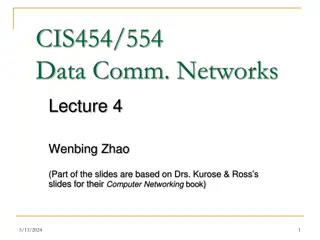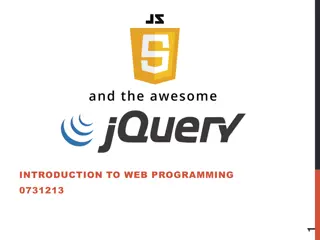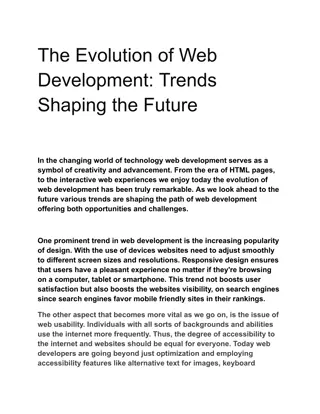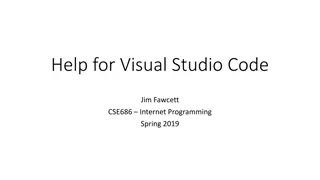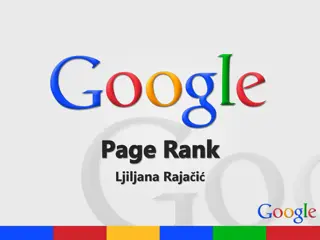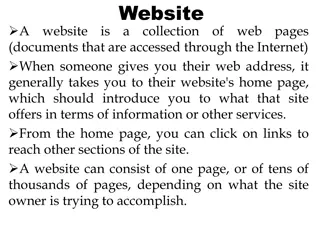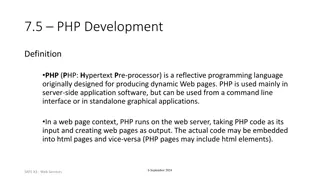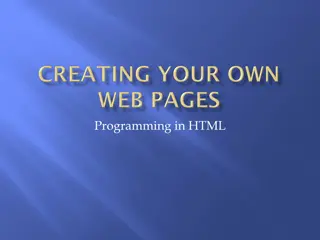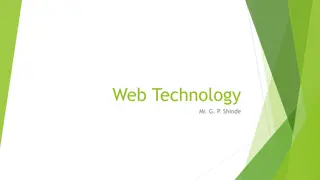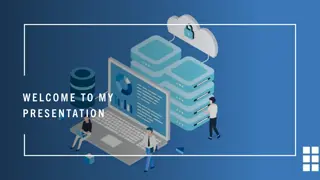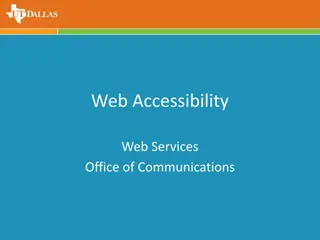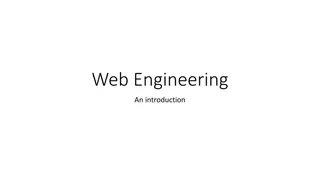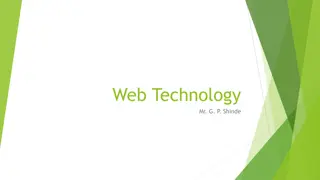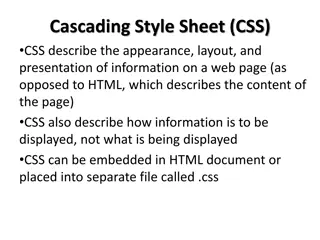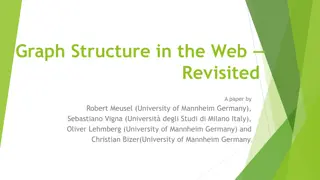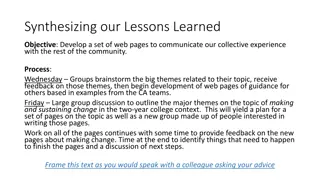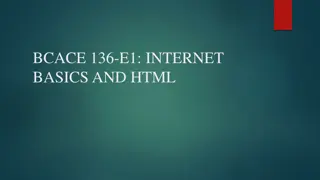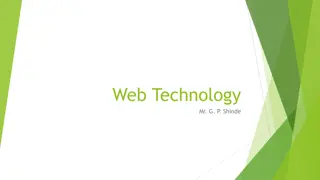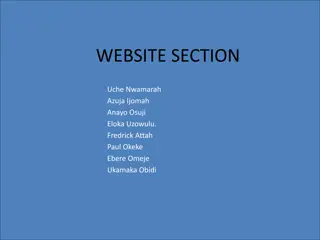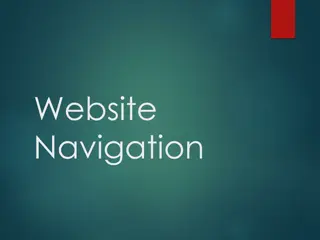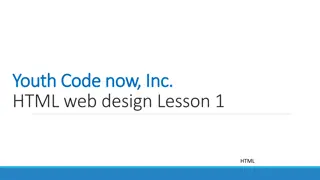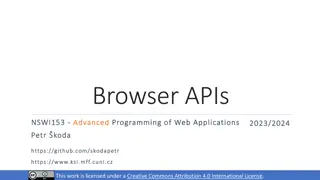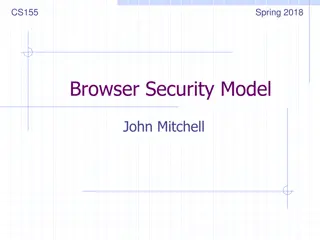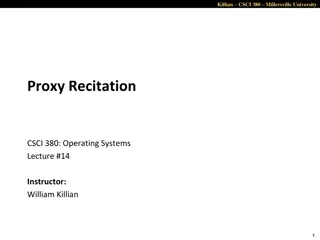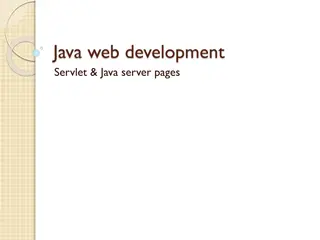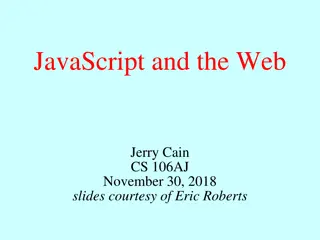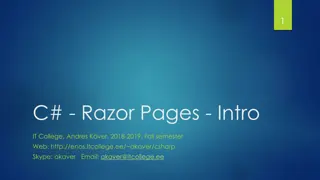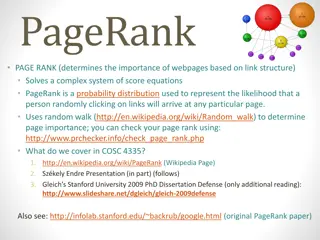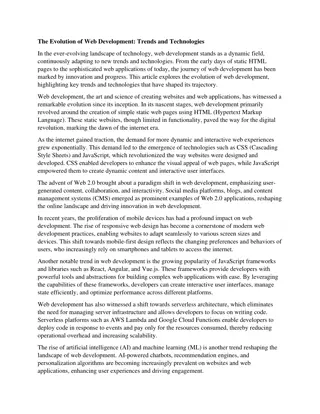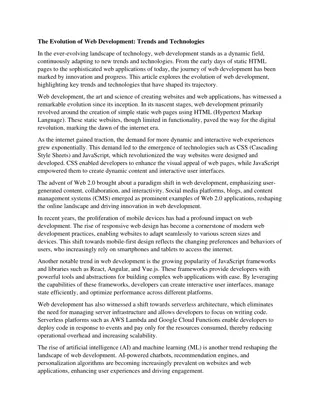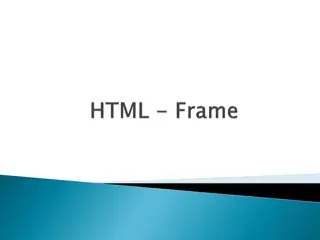Introduction to Web and HTTP Protocols in Data Communication Networks
Explore the fundamental concepts of the World Wide Web and Hypertext Transfer Protocol (HTTP) as integral parts of data communication networks. Delve into the history, structure, and key components of the web, including HTML, common tags, URLs, and HTTP. Understand how information is accessed, trans
1 views • 34 slides
Introduction to Web Programming with JavaScript
Explore the world of web programming with JavaScript, a versatile language widely accepted by web browsers. Discover how JavaScript makes user interaction more engaging, efficient, and dynamic. Learn to manipulate HTML content, styles, and elements with JavaScript functions, and understand where to
0 views • 21 slides
The Evolution of Web Development_ Trends Shaping the Future
In the changing world of technology web development serves as a symbol of creativity and advancement. From the era of HTML pages, to the interactive web experiences we enjoy today the evolution of web development has been truly remarkable. As we look ahead to the future various trends are shaping th
4 views • 4 slides
Web Design & Development company in mohali Amrit web Web Design & Development co
Web Design & Development company in mohali Amrit web
1 views • 9 slides
Getting Started with Visual Studio Code for Web Development
Visual Studio Code (VS Code) is a versatile text editor built with Electron.js that is ideal for developing static web pages and working on Asp.Net Core projects. Learn how to set up and use VS Code for building static web pages by following simple steps like downloading the latest version, organizi
4 views • 10 slides
Taking Web Caching to the Next Level: Challenges and Solutions
Web caching plays a crucial role in improving user experience and reducing internet congestion. By implementing shared web caching on a larger scale, we can achieve significant benefits in terms of latency reduction. However, this approach comes with challenges such as efficient storage and retrieva
1 views • 20 slides
Understanding PageRank Algorithm in Web Search
Dive into the intricacies of the PageRank algorithm, a key component of web search, which ranks web pages based on their importance and influence. Explore topics like link analysis, recursive formulation, flow model, and matrix formulation to grasp how PageRank determines the relevance and credibili
1 views • 25 slides
Understanding Internet Basics and Web Browsers
This content covers the basics of the Internet and World Wide Web, including the differences between the two, the functions of web browsers, components of Internet Explorer, parts of the World Wide Web, conducting effective Internet searches, understanding search results, evaluating websites, and di
0 views • 49 slides
Understanding Websites and Web Pages
Websites are collections of web pages accessed through the Internet, each with a unique web address. Users visit websites to find information they need or to complete tasks. Web pages are digital documents accessible via browsers, containing text, graphics, and multimedia elements. They serve variou
0 views • 8 slides
Introduction to PHP Development for Web Services
PHP, originally designed for dynamic web pages, is widely used in server-side application software. Connecting to web services in PHP does not require class import, and the process involves building the Calling Context structure and running subprograms using SoapClient. PHP allows for seamless integ
0 views • 7 slides
Introduction to HTML for Web Development
HTML, a versatile markup language, is used to design and create web pages. It utilizes a series of markup tags to structure and describe the content of a document, making it accessible and easily understandable for both humans and search engines. While WYSIWYG editors offer a quick way to create web
0 views • 37 slides
Understanding Web Technology: Tools, Techniques, and Evolution
Introduction to Web Technology covering the definition, history of the World Wide Web, types of websites - static and dynamic, web pages, basics of HTML, and more. Explore the concepts that underpin communication between devices over the Internet and the evolution of websites.
0 views • 10 slides
Understanding Web Hosting and Server Types
Web hosting is a service that enables individuals and organizations to make their websites accessible via the World Wide Web. It provides necessary infrastructure, storage, and connectivity to ensure websites are available to users 24/7. The web hosting process involves domain names, DNS translation
0 views • 9 slides
Understanding Web Accessibility and Its Importance
Web accessibility ensures that websites are designed to be inclusive and accessible to all users, regardless of their abilities. By removing barriers, web accessibility allows equal access to information and functionality, benefiting not only users but also businesses. Accessibility is vital in vari
0 views • 10 slides
Exploring the Fundamentals of Web Engineering
Delve into the world of web engineering with an introduction to its motivation, basic paradigms, conceptual architecture, history, protocol stack, the role of the World Wide Web Consortium (W3C), and the nature of web applications. Understand the categories of web applications and how they provide s
0 views • 51 slides
Understanding HTML Tags for Web Development
HTML tags play a crucial role in structuring and formatting content on web pages. They include headings for defining titles and subtitles, paragraph tags for organizing text, dividers like `
` and `
` for layout control, text level formatting tags for text enhancement, and lists for presenting
0 views • 9 slides
Understanding Cascading Style Sheets (CSS)
CSS, or Cascading Style Sheets, plays a crucial role in defining the appearance and layout of web pages separate from the content outlined in HTML. By allowing developers to control the style and presentation of multiple web pages simultaneously, CSS revolutionizes web design. With the ability to em
0 views • 32 slides
Exploring Graph Structure in the Web: A Comprehensive Analysis
Delve into a detailed analysis of the web graph, leveraging a vast dataset of 3.5 billion web pages and 128.7 billion links. The study compares various features such as degree distributions, connectivity, average distances, and connected components' structures. The research aims to enhance ranking m
0 views • 16 slides
Web Page Development for Sharing Experiences
Develop a set of web pages to share collective experiences with the community. Groups brainstorm big themes, receive feedback, and create guidance web pages based on examples. A large group discussion outlines major change themes in two-year college contexts, forming a plan for new web pages. The pr
0 views • 11 slides
Understanding Web Browsers and Internet Explorer
Web browsers are essential software applications that allow users to navigate the internet by interpreting HTML files, handling multimedia content, managing history, and more. Learn about the features of web browsers, their support for web standards like HTML and JavaScript, and how to open Internet
0 views • 17 slides
Introduction to Web Technology and CSS
Web technology involves using different technologies to create and enhance websites. Cascading Style Sheets (CSS) is a design language that helps in making web pages visually appealing. There are three types of CSS: Inline CSS, Internal or Embedded CSS, and External CSS. Each type serves a specific
0 views • 10 slides
UNN Website Development and Maintenance Progress Report
In this report, we detail the ongoing work on the University of Nigeria, Nsukka website, including the current number of web pages, files, sub-domains, and goals for future milestones. The report covers tasks such as population of department pages, routine maintenance, upload of publications, and ad
0 views • 6 slides
Understanding Website Navigation and Site Maps
Website navigation and site maps are essential components for professional web applications with numerous pages. Response.Redirect() and Server.Transfer() methods are useful for page navigation, but for complex applications, creating a site map using ASP.NET's XMLSiteMapProvider is recommended. The
0 views • 13 slides
Understanding Silverlight for Web Hosting Companies
Silverlight is a versatile web technology that provides cross-browser and cross-platform capabilities for creating rich internet applications. It allows for XML-based graphics, animation, audio, video, and event handling, scripted with JavaScript. Integration with web servers via AJAX design pattern
0 views • 16 slides
Understanding How Websites Work with HTML
HTML is the standard markup language for creating web pages. When you surf the web, your browser makes requests to web servers, which then provide responses back to display the web pages. This process allows you to access information instantly from web servers located across the globe.
0 views • 17 slides
Advanced Programming of Web Applications with Browser APIs
Explore advanced programming techniques for web applications using Browser APIs like navigation, history, web pages visibility, multiple windows/tabs, mouse and pointer interaction, and text selection. Learn how to leverage these APIs to create dynamic and interactive web experiences.
0 views • 22 slides
Making Dynamic Page Coalescing Effective on Virtualized Clouds
Creating huge pages through dynamic page coalescing is effective for reducing TLB misses and memory accesses per miss, although it can lead to memory fragmentation and paging overhead. While highly beneficial on native systems, the cost-effectiveness on virtualized platforms is challenged by the inc
0 views • 22 slides
Basic Web Security Model for Secure Electronic Commerce
This presentation covers the basic web security model for secure electronic commerce, focusing on vulnerabilities such as XSS and SQL injection. It discusses the decline in web vulnerabilities since 2009 and explores reported web vulnerabilities. The course theme includes topics like web application
0 views • 38 slides
Understanding Web Security: Threats and Protections
Exploring the landscape of web security through discussions on historical vulnerabilities, top web threats, browser security models, and the goals of web security. Delve into the world of web programming, security threat models, and learn about the goals and importance of maintaining a secure web br
0 views • 74 slides
Understanding How the Web Works with Telnet and cURL Demonstrations at Millersville University
Explore the inner workings of the web through Telnet and cURL demonstrations in William Killian's CSCI 380 lecture at Millersville University. Discover how networking basics, proxies, and string manipulation in C play crucial roles in fetching content online. Dive into practical examples like manual
0 views • 37 slides
Understanding Java Web Development with Servlet and JSP Environment
Learn about the evolution of web development from static HTML pages to dynamic pages using Java servlets and JSP. Explore the concept of Request-Response cycle, advantages of dynamic web pages, and the history of CGI technology in creating dynamic server-side content.
0 views • 33 slides
Ultimate Guide to Own Web Now's Web Hosting Platform
Dive into Own Web Now's web hosting platform through this comprehensive startup guide, which covers the process of ordering website hosting, deployment, management, and publishing website content. Learn about the Linux/PHP and Windows ASP.NET hosting options, how to configure your hosting account, m
0 views • 7 slides
The Evolution of JavaScript and the Web
Exploring the historical roots of the World Wide Web, from early visions by pioneers like Paul Otlet and Vannevar Bush to the development of the modern web by Tim Berners-Lee. Learn about the Document Object Model (DOM) and how JavaScript interacts with web pages to manipulate content. Dive into wri
0 views • 8 slides
Tips for Crafting High-Converting Landing Pages
Crafting high-converting landing pages is essential for successful marketing campaigns. Learn best practices such as getting to the point, using contrasting colors for call-to-action buttons, and maintaining consistent branding throughout your pages. With a focus on user attention and visual appeal,
0 views • 30 slides
Introduction to C# Razor Pages in ASP.NET Core MVC
C# Razor Pages is a new aspect of ASP.NET Core MVC framework, designed for page-focused workflows. It simplifies web application development by allowing the mixing of C# code with HTML in a single file. This technology enables the creation of basic pages, handling different web verbs, and working wi
0 views • 22 slides
Exploring Privacy on the Web: Understanding the Deep and Dark Web
Delve into the intricate world of internet privacy, from the surface web to the hidden realms of the deep and dark web. Discover the importance of safeguarding personal data online, the significance of the Deep Web's unindexed content, and the intricacies of the Dark Web accessible via specific soft
0 views • 25 slides
Understanding PageRank Algorithm and Its Importance in Web Search
The PageRank algorithm determines the importance of webpages based on their link structure, using a probability distribution to represent the likelihood of randomly arriving at a particular page via clicking on links. PageRank employs a random walk approach, and its Surfer Model analyzes web structu
0 views • 41 slides
The Evolution of Web Development: Trends and Technologies
In the ever-evolving landscape of technology, web development stands as a dynamic field, continuously adapting to new trends and technologies. From the early days of static HTML pages to the sophisticated web applications of today, the journey of web
0 views • 2 slides
The Evolution of Web Development: Trends and Technologies
In the ever-evolving landscape of technology, web development stands as a dynamic field, continuously adapting to new trends and technologies. From the early days of static HTML pages to the sophisticated web applications of today, the journey of web
0 views • 2 slides
Understanding Web Pages Created Using Frames
Web pages created using frames consist of a "master" HTML document describing the frameset arrangement. Frames are arranged on the page using FRAMESET and FRAME tags. The basic structure of a framed document includes HTML, HEAD, FRAMESET, FRAME, NOFRAMES, and BODY tags. Frames can be sectioned off u
0 views • 13 slides
